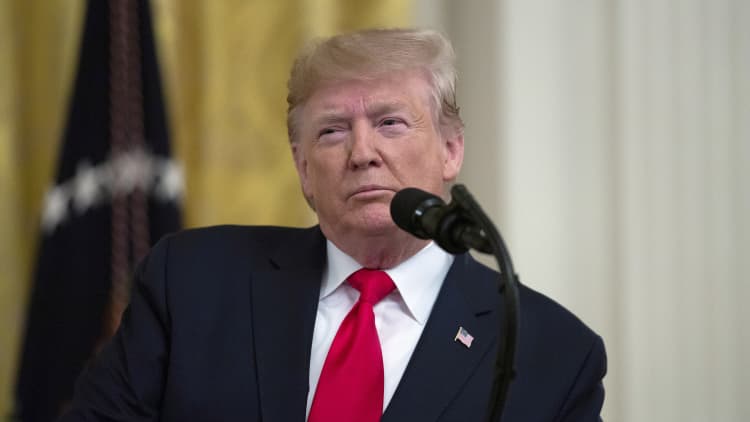
President Donald Trump said Friday that America does not seek "regime change" in Iran, less than a day after the U.S. launched an airstrike that killed the country's top general, Qasem Soleimani.
But the U.S. is "ready and prepared to take whatever action is necessary" if Iran threatens American lives, Trump added.
"We took action last night to stop a war," the president said in his first television address since Soleimani's death was announced Thursday night. "We did not take action to start a war."
Soleimani "made the death of innocent people his sick passion," Trump said from his Palm Beach, Florida, resort, Mar-a-Lago. "We caught him in the act and terminated him."
He took no questions from reporters.
On a call with reporters Friday, National Security Advisor Robert O'Brien described the U.S. strike as a "straightforward decision."
O'Brien, who was with Trump during the strike, said the U.S. had credible intelligence that Iran was mounting an attack. He did not specify what kind of intelligence the U.S. had.
Soleimani, who led a special forces unit of Iran's elite Revolutionary Guards, has been a key figure in Iranian and Middle East politics. He and an aide were killed in a U.S. airstrike at Baghdad's international airport.
His death exacerbated already-high tensions between Iran and the U.S., and triggered concerns of retaliation from Iran and proxy forces.
On the heels of Thursday's attack, the Department of Defense issued a statement saying that the strike was aimed at "deterring future Iranian attack plans" and that the U.S. military would continue to "take all necessary action to protect our people and our interests wherever they are around the world."
A senior State Department official, who was authorized to speak on condition of anonymity, told reporters Friday that Soleimani had planned attacks that targeted U.S. diplomats and military personnel in Iraq, Syria, Lebanon and other parts of the Middle East.
The latest revelations come days after Iran-backed militias attacked the U.S. Embassy in Baghdad. The two-day embassy assault prompted Trump to order the initial deployment of approximately 750 soldiers from the U.S. Army's 82nd Airborne Division to the Middle East.
On Thursday, before the U.S. airstrike that killed Soleimani, Secretary of Defense Mark Esper told reporters at the Pentagon that the U.S. may conduct preemptive strikes against Iranian-backed militias.
"If we get word of attacks, we will take preemptive action as well to protect American forces, protect American lives. The game has changed," Esper said.
In the wake of the U.S. drone strike, Trump approved another deployment Friday of approximately 3,500 troops to the region.
After Trump's unannounced speech, he departed Mar-a-Lago en route to Miami, where he was scheduled to attend the launch of his 2020 presidential campaign's "Evangelicals for Trump" coalition.
More than three dozen influential evangelical leaders are expected to attend, a Trump campaign source told CNBC.
— CNBC's Yelena Dzhanova contributed to this report.



